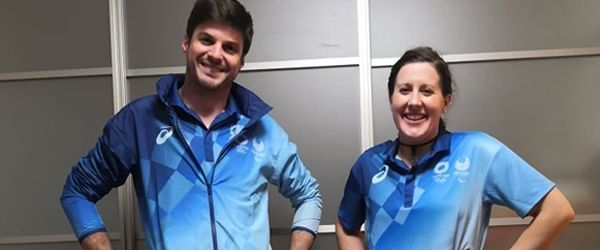
Behind the scenes as an Olympic volunteer
As top athletes from around the world suit up to compete in the Olympics, several SEND Japan folks will don their own Olympic uniforms.
Karen Johnson, Evan Easom, Sue Yau, and Joshua May all applied three years ago to volunteer at the games, which originally were set for summer 2020. In addition to forcing a one-year postponement, the COVID-19 pandemic has made one of the world’s most complex events even more complicated.
“Things have been so pared down: no international volunteers, no spectators at all,” said Evan, who will be volunteering at the Olympic Family Hotel, where the International Olympic Committee stays. “The games will be very different this year. I think missional connections will become easier for me to make because there will more time with Japanese people.”
Karen gave us a behind-the-scenes look at becoming a volunteer at the Tokyo 2020 (though they will be played in 2021) Olympic games.
Her venue assignment
“I’m assigned to the Asaka Shooting Range. I’ve never watched any shooting! The event services manager asked the volunteers, ‘Who here has shot a gun?’ Only one guy had! But it’s really interesting to learn about the physical and mental demands of the competition.
“I was supposed to be an event services team leader, working with spectators. Now, without spectators, I’ll be supporting competition management, still at the shooting range. They’ll train me on the first day. I'm excited to see what I will do!”
The application process
“We applied back in 2018. A few months later, we were asked to come to an in-person interview. They gave us an introduction to the games. Then they gave us a challenge—who could build the highest tower with the newspaper. At our table, we had a mix of English and Japanese speakers. When you have six different people, and a language barrier, how do you navigate all the different ideas and opinions? Honestly, our tower was awful, but we had so much fun doing it.”
What they asked
“After the newspaper challenge, we interviewed in pairs. Evan and I did it together, in English. They saw that we both had driver’s licenses and asked if we would be drivers for the Olympics, but we both preferred not to. It’s a lot of pressure to drive through downtown Tokyo!
“They also asked why we wanted to volunteer. For me, it’s the excitement of how, for a short time, the Olympics unites the world. I love living in Japan, especially as a foreigner. I understand enough of Japanese culture and enough of American culture to be a bridge. It’s very exciting!”
The volunteer uniform
“When we went to the interview, we tried on the uniform—but no one could know what it was going to look like. So, it wasn’t the actual uniform, it was a monochromatic version made by the company Asics. It’s weird to think pre-COVID now, but they just had racks of stuff, and we tried on bucket hats and polos and those pants that zip off and turn into shorts. The uniform is actually on loan. We don’t get to keep it, but we do get to keep the mask!”

Evan and Karen in their Olympic uniforms.
“We do get to keep the mask!"
Big badges
“When we applied, we had to submit a headshot that met very specific requirements. That photo became our accreditation card. It’s weird to think that the photo I have is from three years ago. The cards are huge! There’s no hiding them.”
Training
“I can’t even tell you how many in-person trainings we had before COVID. Quite a few! They generally had a choice of training options in English. But, with closing the borders and not allowing foreigners in, now there are far fewer English options.
“With the COVID restrictions, a lot of training moved online. We had videos to watch about what to expect for the games, what to bring when you show up for your shift. We did a CPR class online, and we had to have a shirt, a pillow, and a plastic bottle to practice chest compressions. It was so funny to watch it on the video chat!”
Avoiding COVID
“Japan has been very cautious. Two weeks before we start volunteering, we have to start tracking our temperature, and we have to keep doing that for 14 days past our last shift. If you feel even a little unwell, you’re not supposed to come in. They gave us our own bottles of hand sanitizer, and they really encourage us to clean our hands as much as possible. And there’s just a general mindset of, ‘Of course we’re going to wear masks.’ I think the precautions they’ve put in place are sufficient and they’re going to do well with them.”
Avoiding COVID controversy
“Last I heard, 60 percent of the Japanese people did not want the Olympic games to go on. I have Olympics and Paralympics shirts, but I wear them just at home, because I don’t know how my neighbors or my community feel about it.”
Making connections
“I’m praying for my team. As volunteers, we aren’t supposed to blatantly talk about religion. But I’m thinking about how I can show Christ’s love to my team. How can I care for them well? How can I love them well? How can my interactions with them be different than their interactions with everyone else? During mealtimes, we’re not supposed to talk, but after mealtimes, when we can mask up again, how can I use that time to get to know them, to hear their unique stories? I want to make the most of every opportunity with them. I’m excited to see how God’s going to work through this!”
Additional Posts





